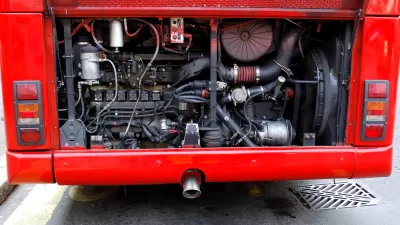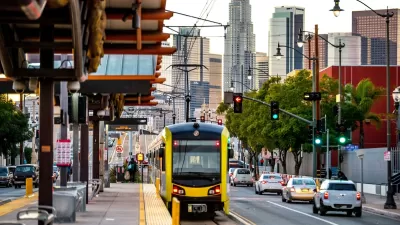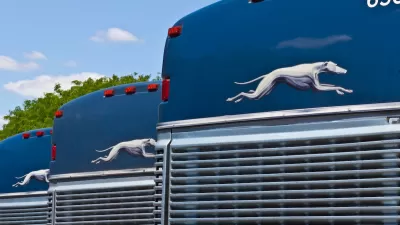"The rise in mass transit ridership should be great news. Not since the OPEC oil embargo and energy crisis in the '70s have famously car-centric Americans been so eager to shell out for a bus fare or a train ticket and leave the polluter in the driveway. Automobile transportation is one of the largest chunks of the country's carbon footprint, so the more that Americans opt for trains and buses, the more that footprint could shrink.
But the news isn't all that sunny. In fact, the mini-exodus from driving has exposed significant cracks in the country's mass transit systems, which are struggling to accommodate new riders. Having spent decades forsaking the bus and the train for the convenience and privacy of cars, Americans are now finding that the buses, streetcars, trolleys and trains that they left behind are strapped for cash, if they still exist at all.
'All across the country, public transportation systems are experiencing capacity problems,' says Virginia Miller, a spokeswoman for the American Public Transportation Association. 'Due to the high costs of fuel, systems' budgets are being severely impacted.' A survey of 115 of the association's members found that 60 percent of the systems are considering fare increases, while 35 percent are experiencing service cuts. 'It's ironic that at a time of record ridership we don't have the funding to expand public transportation systems,' says Miller."
FULL STORY: Who says Americans won't ride mass transit?

Alabama: Trump Terminates Settlements for Black Communities Harmed By Raw Sewage
Trump deemed the landmark civil rights agreement “illegal DEI and environmental justice policy.”

Planetizen Federal Action Tracker
A weekly monitor of how Trump’s orders and actions are impacting planners and planning in America.

The 120 Year Old Tiny Home Villages That Sheltered San Francisco’s Earthquake Refugees
More than a century ago, San Francisco mobilized to house thousands of residents displaced by the 1906 earthquake. Could their strategy offer a model for the present?

In Both Crashes and Crime, Public Transportation is Far Safer than Driving
Contrary to popular assumptions, public transportation has far lower crash and crime rates than automobile travel. For safer communities, improve and encourage transit travel.

Report: Zoning Reforms Should Complement Nashville’s Ambitious Transit Plan
Without reform, restrictive zoning codes will limit the impact of the city’s planned transit expansion and could exclude some of the residents who depend on transit the most.

Judge Orders Release of Frozen IRA, IIJA Funding
The decision is a victory for environmental groups who charged that freezing funds for critical infrastructure and disaster response programs caused “real and irreparable harm” to communities.
Urban Design for Planners 1: Software Tools
This six-course series explores essential urban design concepts using open source software and equips planners with the tools they need to participate fully in the urban design process.
Planning for Universal Design
Learn the tools for implementing Universal Design in planning regulations.
Clanton & Associates, Inc.
Jessamine County Fiscal Court
Institute for Housing and Urban Development Studies (IHS)
City of Grandview
Harvard GSD Executive Education
Toledo-Lucas County Plan Commissions
Salt Lake City
NYU Wagner Graduate School of Public Service





























